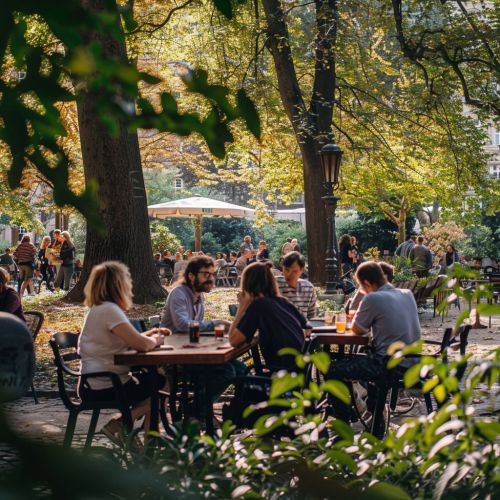Social Construction of Reality: Difference between revisions
(Created page with "== Introduction == The concept of the '''social construction of reality''' is a fundamental theory in sociology and philosophy that explores how individuals and groups shape their perceptions of the world through social interactions. This theory posits that much of what we understand as reality is not an objective truth but rather a construct created by societal norms, values, and beliefs. The term was popularized by Peter L. Berger and Thomas Luckmann in their s...") |
No edit summary |
||
| Line 35: | Line 35: | ||
Media studies utilize the social construction of reality to analyze how media representations shape public perceptions. The portrayal of events, people, and issues in the media can reinforce or challenge existing social constructs, thereby influencing societal attitudes and behaviors. | Media studies utilize the social construction of reality to analyze how media representations shape public perceptions. The portrayal of events, people, and issues in the media can reinforce or challenge existing social constructs, thereby influencing societal attitudes and behaviors. | ||
[[Image:Detail-96147.jpg|thumb|center|People engaging in a lively discussion in a social setting, such as a café or a park.|class=only_on_mobile]] | |||
[[Image:Detail-96148.jpg|thumb|center|People engaging in a lively discussion in a social setting, such as a café or a park.|class=only_on_desktop]] | |||
== Criticisms and Debates == | == Criticisms and Debates == | ||
Latest revision as of 08:33, 4 July 2024
Introduction
The concept of the social construction of reality is a fundamental theory in sociology and philosophy that explores how individuals and groups shape their perceptions of the world through social interactions. This theory posits that much of what we understand as reality is not an objective truth but rather a construct created by societal norms, values, and beliefs. The term was popularized by Peter L. Berger and Thomas Luckmann in their seminal work, "The Social Construction of Reality: A Treatise in the Sociology of Knowledge" (1966).
Historical Background
The roots of the social construction of reality can be traced back to classical sociological theories. Émile Durkheim's work on collective consciousness and Max Weber's analysis of social action laid the groundwork for understanding how social forces shape individual perceptions. However, it was Berger and Luckmann who synthesized these ideas into a comprehensive framework, emphasizing the role of language and communication in constructing reality.
Key Concepts
Reality and Knowledge
Berger and Luckmann argue that reality is socially constructed through a process they term "habitualization" and "institutionalization." Habitualization refers to the repetition of actions that become routine, while institutionalization occurs when these routines are embedded into social institutions. Over time, these institutions gain legitimacy and become taken for granted as "reality."
Language and Symbolic Interaction
Language plays a crucial role in the social construction of reality. Through symbolic interaction, individuals communicate and negotiate meanings, which are then internalized and perpetuated within society. This process is continuous and dynamic, allowing for the evolution of social norms and values.
Typification and Objectivation
Typification involves categorizing and generalizing experiences to make sense of the world. Objectivation is the process by which these typifications become externalized and perceived as objective reality. For instance, the concept of "money" is a social construct that gains objectivity through widespread acceptance and use.
Theoretical Frameworks
Phenomenology
Phenomenology, particularly the work of Alfred Schutz, heavily influences the social construction of reality. Schutz's emphasis on the subjective experience and the "lifeworld" aligns with Berger and Luckmann's focus on how individuals perceive and interpret their social environment.
Ethnomethodology
Harold Garfinkel's ethnomethodology examines the methods people use to make sense of their everyday lives. This approach complements the social construction of reality by highlighting the implicit rules and practices that underpin social interactions.
Postmodernism
Postmodernist theorists, such as Michel Foucault and Jean Baudrillard, further expand on the idea of constructed realities by questioning the notion of objective truth. They argue that power dynamics and media play significant roles in shaping perceptions of reality.
Applications and Implications
Sociology
In sociology, the social construction of reality provides a framework for understanding how social phenomena, such as gender roles, race, and class, are created and maintained. It challenges the notion of inherent social structures and emphasizes the fluidity of social categories.
Psychology
In psychology, this theory influences social psychology and cognitive psychology, particularly in understanding how social contexts affect individual cognition and behavior. Concepts like self-fulfilling prophecy and stereotype threat are grounded in the idea that social constructs influence personal identity and actions.
Media Studies
Media studies utilize the social construction of reality to analyze how media representations shape public perceptions. The portrayal of events, people, and issues in the media can reinforce or challenge existing social constructs, thereby influencing societal attitudes and behaviors.


Criticisms and Debates
Objectivity and Relativism
One of the primary criticisms of the social construction of reality is its perceived relativism. Critics argue that if all reality is socially constructed, it undermines the possibility of objective knowledge. Proponents counter that acknowledging social constructs does not negate the existence of objective phenomena but rather highlights the interpretive frameworks through which they are understood.
Power and Inequality
Another critique focuses on the theory's treatment of power and inequality. While Berger and Luckmann address the role of institutions, critics argue that they do not sufficiently account for how power dynamics influence the construction of reality. Later theorists, such as Foucault, have expanded on this aspect, emphasizing the interplay between knowledge and power.
Contemporary Developments
Digital Age
In the digital age, the social construction of reality takes on new dimensions. The rise of social media and digital communication platforms has transformed how reality is constructed and perceived. Online communities and virtual interactions create new spaces for constructing and negotiating meanings.
Globalization
Globalization also impacts the social construction of reality by facilitating cross-cultural interactions and the exchange of ideas. This process can lead to the hybridization of social constructs, where local and global influences merge to create new realities.
See Also
- Symbolic Interactionism
- Phenomenology (philosophy)
- Ethnomethodology
- Postmodernism
- Social Psychology
- Media Studies
References
- Berger, P. L., & Luckmann, T. (1966). The Social Construction of Reality: A Treatise in the Sociology of Knowledge. Garden City, NY: Anchor Books.
- Durkheim, E. (1912). The Elementary Forms of the Religious Life. London: Allen & Unwin.
- Weber, M. (1922). Economy and Society. Berkeley: University of California Press.
- Schutz, A. (1967). The Phenomenology of the Social World. Evanston, IL: Northwestern University Press.
- Garfinkel, H. (1967). Studies in Ethnomethodology. Englewood Cliffs, NJ: Prentice-Hall.
- Foucault, M. (1977). Discipline and Punish: The Birth of the Prison. New York: Pantheon Books.
- Baudrillard, J. (1981). Simulacra and Simulation. Ann Arbor: University of Michigan Press.
